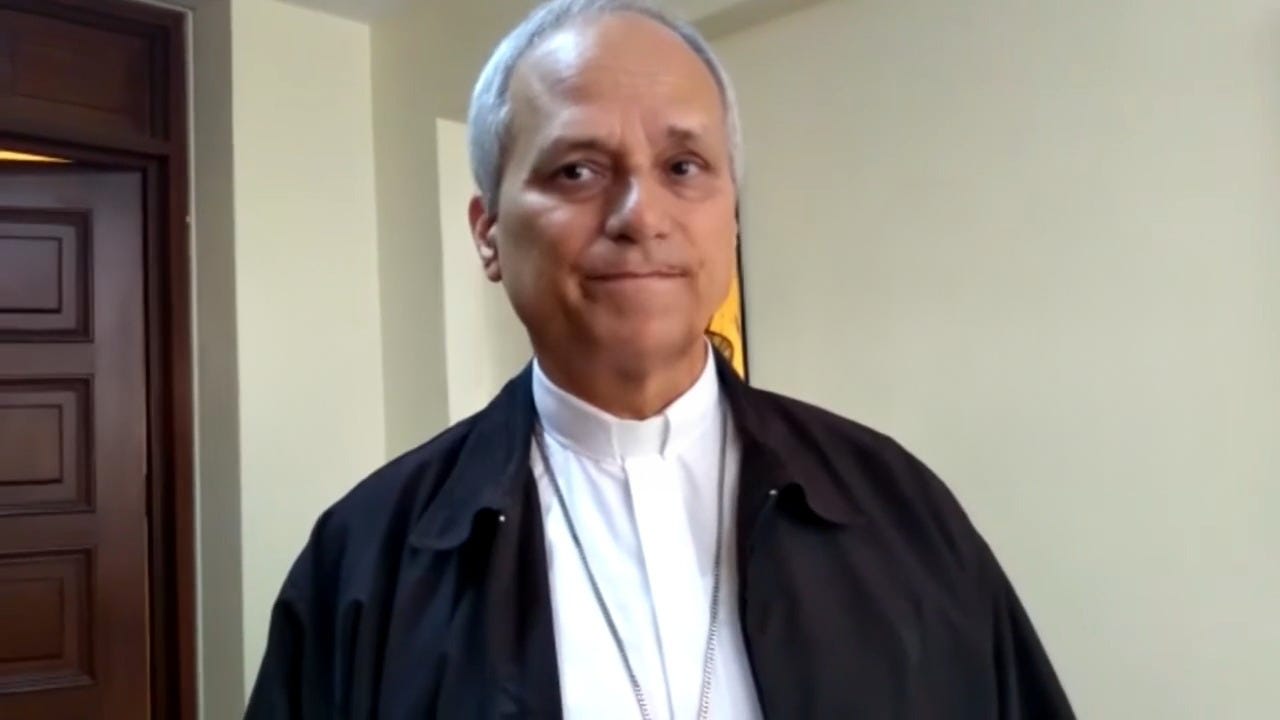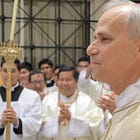Leo XIV: 'The death penalty is inadmissible'
Leo XIV—then Bishop Robert Prevost—affirmed the grievous error of Francis on the 'inadmissibility' of capital punishment. What effect does this have on his claim to the papacy?

Leo XIV—then Bishop Robert Prevost—affirmed the grievous error of Francis on the 'inadmissibility' of capital punishment. What effect does this have on his claim to the papacy?
Our friends at American Reform drew our attention to then-Bishop Robert Francis Prevost (now ‘Leo XIV’) a denial of the admissibility of capital punishment, on 18 April 2022.
State of the Question
The legitimacy of capital punishment is explicitly affirmed by Holy Scripture:
“Whosoever shall shed man’s blood, his blood shall be shed: for man was made to the image of God” (Gen 9:6).
It is explicitly affirmed by the Catechism of the Council of Trent:
The power of life and death is permitted to certain civil magistrates because theirs is the responsibility under law to punish the guilty and protect the innocent. Far from being guilty of breaking this commandment [Thou shall not kill], such an execution of justice is precisely an act of obedience to it. For the purpose of the law is to protect and foster human life. This purpose is fulfilled when the legitimate authority of the State is exercised by taking the guilty lives of those who have taken innocent lives.
In the Psalms we find a vindication of this right: “Morning by morning I will destroy all the wicked in the land, cutting off all evildoers from the city of the Lord” (Ps. 101:8).
(Roman Catechism of the Council of Trent, 1566, Part III, 5, n. 4)
It is also explicitly affirmed by the teaching of the magisterium. Christian Washburn writes:
In the twelfth and thirteenth centuries, the Church was confronted with the Waldensian heresy. In 1208, Pope Innocent III imposed a profession of faith upon those Waldensians who wished to be reconciled to the Church. In 1209 and 1210 the pope modified this profession to include the following:
With regard to the secular power, we affirm that it can exercise a judgment of blood without mortal sin, provided that in carrying out the punishment it proceeds, not out of hatred, but judiciously, not in a precipitous manner, but with caution.
‘Capital Punishment and the Infallibility of the Ordinary and Universal Magisterium’, in The Thomist 82, 2018.
The Church infallibly condemned the following error of Martin Luther, clearly affirming the legitimacy of capital punishment in principle:
[Error] 33. That heretics be burned is against the will of the Spirit.
Bull Exsurge Domine, June 15, 1520
It is also explicitly affirmed as recently as Pius XII:
Even in the case of the death penalty the State does not dispose of the individual’s right to life. Rather public authority limits itself to depriving the offender of the good of life in expiation for his guilt, after he, through his crime, deprived himself of his own right to life.
(Pope Pius XII, Address given September 14, 1952)
Edward Feser has also written a very thorough book addressing this issue.
All in all, the legitimacy of the death penalty seems to be a matter of faith, such that denying it constitutes heresy.
Prevost’s words
Video courtesy of American Reform
La República reported the following in 2022:
Robert Prevost: “The death penalty is not admissible”
The bishop of the Diocese of Chiclayo lamented the abuse suffered by a young girl; however, he affirmed that such a measure is not appropriate, not even in tragic cases, and also questioned the effectiveness of chemical castration.
After the abuse suffered by a young girl in the Lambayeque region, the bishop of the Diocese of Chiclayo, Monsignor Robert Prevost, condemned these violent acts which provoked public outrage. However, he stated that the Church does not accept the death penalty and instead proposes joint efforts to prevent similar situations and ensure that justice prevails.
“This case is deplorable. The causes and reasons must be examined in order to reform society, which includes the formation of children and young people, so that this kind of incident does not happen again,” he told the media.
In that vein, he called for justice to act efficiently and swiftly, though he stressed that he supports life at all times. “In the Church, we teach that the death penalty is inadmissible, not even in a tragic case like this. We must seek other ways to achieve justice,” Prevost stated.
Chemical castration
For the Church authority, chemical castration would not be a viable measure in the case of individuals accused of sexual assault.
“Chemical castration is being much debated, but in the countries where it is used, the results are also unconvincing.
“Trying to control these manifestations (of crime) must be addressed in depth. This measure, as a deterrent, is not effective. Experts will have to evaluate,” he emphasised.
Prevost affirmed that vengeance is unworthy of the human person, and instead diminishes him in his dignity.
President of the Court of Justice of Lambayeque. Photo: Clinton Medina/La República.
“It is important to make an appeal to society. The Diocese of Chiclayo rejects sexual abuse, violence, kidnapping, and human trafficking. I believe it is important to seek the root causes of such acts and find solutions,” he insisted.
He expressed solidarity with the family, while acknowledging that there is no way to soften the pain caused by the harm done to a child. Finally, he noted that acting ‘blood for blood’ is not the answer.
In favour of the death penalty
For his part, the regional governor of Lambayeque, Luis Díaz, expressed support for the death penalty in cases involving crimes against children. He even proposed that the executive branch withdraw Peru from the Inter-American Court of Human Rights (IACHR).1
This report will be updated in due course with further information on the events that led to the protests to which Prevost was responding.
In addition, in 2015, Prevost tweeted the following:
While it may not be illegitimate to want to see the end of the capital punishment, this does indicate Leo XIV’s mindset.
Conclusion
Some have tried to obscure the situation, claiming that saying capital punishment is “inadmissible” indicates a merely prudential judgment, pertaining to the current circumstances of our time. Novus Ordo Watch and others have exploded this semantic game many times, as well as the bad arguments upon which the “prudential judgment” is based (see here for a systematic account).
Is it possible that Prevost is mistaken and in good faith, or that his mind is corroded by liberalism such that he cannot be pertinacious? It is not, for the reasons below:
Further we should note that the problems of Vatican II and modernisms are not problems of this or that error, but of a “wholesale perversion of mind,” as Lefebvre said:
The more one analyzes the documents of Vatican II, and the more one analyzes their interpretation by the authorities of the Church, the more one realizes that what is at stake is not merely superficial errors, a few mistakes, ecumenism, religious liberty, collegiality, a certain Liberalism, but rather a wholesale perversion of the mind, a whole new philosophy based on modern philosophy, on subjectivism.
To conclude, as we have written elsewhere, Prevost is neither a coward or a [discreet] tactician, but a loyal son of Francis, and that he will continue the work of his master and benefactor—even if he does so in a more discreet and moderate way.
This raises grave questions about whether or not Prevost can be said to profess the Catholic faith at all, and thus whether he is a member of the Church. If he is not a member of the Church, then it is not possible for him to be validly elected as pope.
At the very least, there is serious doubt on the matter: and a man whose visible membership in the Church is itself in serious doubt can only be doubtfully elected to the papacy, even if the conclave is unanimous. Should such a man be elected, the resulting doubt would not be about his popularity or policies, but about his very authority. This is why great theologians and canonists held that a doubtful pope is no pope at all.
Needless to say, these points have implications that extend beyond just Prevost, applying also to those other cardinals who have been “discreet” and “moderate” in the face of Francis’ doctrinal aberrations. It is not enough to ask whether a man is prudent, discreet, or personally sincere. The question is whether he externally professes the faith whole and entire. If the answer is not a clear “Yes,” then the conclusion is clear: he cannot be validly elected or accepted as pope.
It is not possible to say “Yes” until he renounces at least the doctrinal aberrations which are “at his door,” having inherited them from his immediate predecessor—such as this error on the death penalty error, as well as the Abu Dhabi Declaration, Amoris Laetitia, Fiducia Supplicans, etc.
And even then, there will be more errors for him to renounce, before one can say with moral certainty, “This man professes the Catholic faith.”
You can see a full report, with all supporting evidence, here:
Could Cardinal Prevost be the first American pope?
HELP KEEP THE WM REVIEW ONLINE WITH WM+!
As we expand The WM Review we would like to keep providing free articles for everyone.
Our work takes a lot of time and effort to produce. If you have benefitted from it please do consider supporting us financially.
A subscription gets you access to our exclusive WM+ material, and helps ensure that we can keep writing and sharing free material for all.
(We make our WM+ material freely available to clergy, priests and seminarians upon request. Please subscribe and reply to the email if this applies to you.)
Subscribe to WM+ now to make sure you always receive our material. Thank you!
Further reading:
Follow on Twitter, YouTube and Telegram:
https://larepublica.pe/sociedad/2022/04/18/robert-prevost-la-pena-de-muerte-no-es-admisible-lrnd?#







If the father is a merchant, he will have his sons given to commerce, if he is a gambler, he will have gambling sons, if a fornicator, he will bring up his sons to be fornicators, if he is an idolator he will teach his sons idolatry, and finally if he is a heretic he will infect his sons with the same heresy. This has been confirmed by practical experience in many places, that the sons are drawn into the same heresy as that into which their parents have fallen. Bohemia stands witness, which under their King Wenceslaus IV and Emperor Sigismund of the Romans defected from the Catholic faith more than 140 years ago and up to the present has never returned to the faith. 3 This is for no other cause than that their children from a tender age drank in the example of those errors, to which they saw their parents to be disposed. Indeed I fear (may God condescend to avert it by his love) that the same will happen in Germany and England. Because if children drink in the same Lutheran heresy from their parents, by which the latter are now infected, those provinces will not quickly be converted to the Catholic faith. For as Solomon says, the young man trained in the way that he should live his life, even when he is old, will not depart from it (Proverbs 22.6). And the great poet has said, “The jar will long keep the smell of what was steeped in it.” 4
https://www.taylorfrancis.com/chapters/mono/10.4324/9781003089131-13/alfonso-de-castro-concerning-punishment-heretics-salamanca-ioannes-giunta-1547-ian-campbell-todd-rester?context=ubx